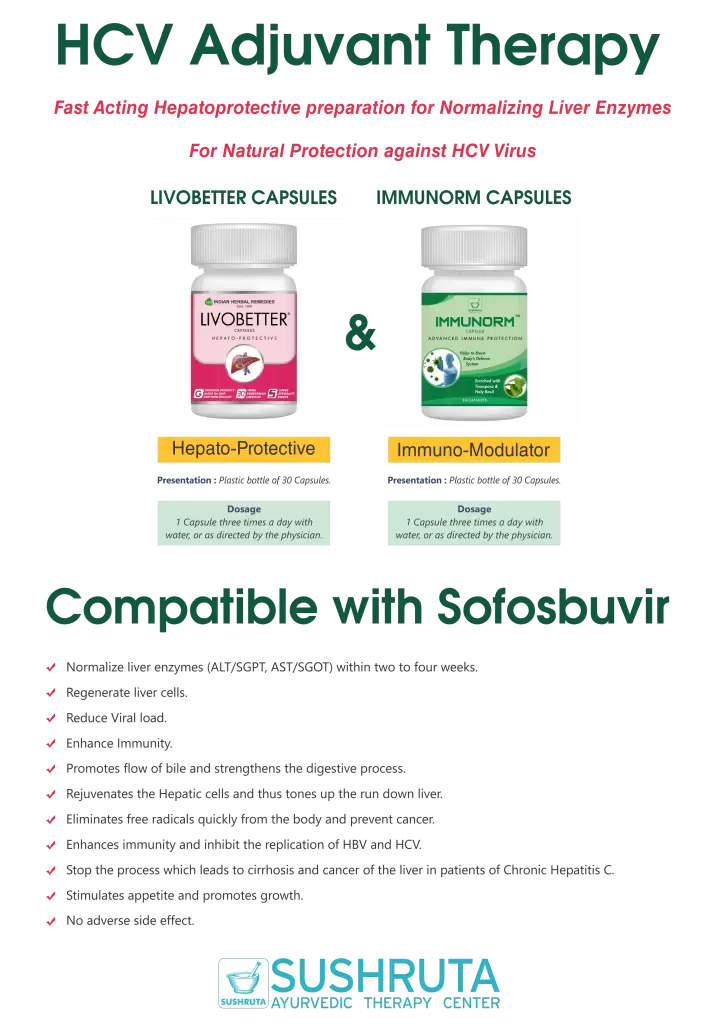Our Herbal Treatment of Hepatitis C with ‘HCV Compounds’
Hepatitis C is turning into a significant medical condition of north India, which represents one-fourth of all instances of ongoing liver illnesses in the locale and public concern is raising. Until the mid-1990s, Interferon was the main accessible treatment in present day medication. The expansion of Ribavirin, a nucleoside simple, significantly worked on the reaction; be that as it may, viral genotype stays a significant determinant of reaction rate. It appears to be that interferon treatment alone or in blend might forestall movement of hepatic fibrosis in contaminated patients regardless of whether fix isn’t accomplished. Despite the fact that Ribavirin alone doesn’t appear to be dynamic against HCV, the blend brought about significantly better and supported biochemical, virological and histological reaction rates.
Ongoing examinations have shown that long-acting pegylated interferon (changed type of interferon) have preferable viral reaction over standard INF-an arrangements and in blend with Ribavirin, accomplished supported viral destruction paces of 54-56% In India, the level of supported responders is very high (50-60%). Such reaction of INF-a treatment in ongoing hepatitis C is because of a dominating pervasiveness of hepatitis C genotype 3 around here, which is interferon delicate.
Tragically, backslide happens in the greater part of these situations when treatment is halted. No other therapy choice was accessible for patients with ongoing hepatitis C – accordingly, in spite of these humble reactions, both interferon and ribavirin are costly as well as make serious side impacts. Interferon-based treatment is particularly hazardous in patients with mental problems like misery. As a matter of fact, a background marked by serious sadness or other mental circumstances is viewed as a somewhat solid contraindication to interferon-based treatment, since portion reliant and reversible neuro – mental impact happens in 30 to 40% of patients during treatment.

Scope of Alternative Medicine
In this manner, there is a need to investigate the extent of savvy normal items with negligible secondary effects in the therapy of persistent hepatitis C.
In Ayurvedic texts following spices are usually suggested for patients experiencing Constant Liver Problems:
Andrographis paniculata, Raphanus sativus, Achyranthes aspera, Curcuma longa, Glycyrrhiza glabra, Rheum emodi, Cichorium intybus, Tinospora cordifolia, Aloe vera, Berberis aristata, Boerhavia diffusa, Eclipta alba, Solanum nigrum, Emblica officinalis, Ocimum sanctum, Terminalia chebula and Terminalia arjuna.
Preliminary work done by Dr Harish Verma (BAMS)
On the basis of following major pharmacological actions of herbs from above mentioned group:
1. Hepatoprotective
2. Immuno Modulator
The observation was initiated with a view to find out :
- Whether Livobetter Capsules and Immunorm Capsules can normalize the raised serum alanine aminotransferase (ALT) enzymes in HCV patients.
- Whether Livobetter Capsules and Immunorm Capsules can help in reducing the ‘Viral Load’ in the blood
- Whether recurrence, which is common feature, can be prevented by Livobetter Capsules and Immunorm Capsules
Our observation on approx. 500 patients of positive anti – HCV antibodies confirmed that HCV Compounds :
- Livobetter Capsules and Immunorm Capsules were well tolerated by all patients.
- Patients with history of recurrence or relapse after Interferon & Ribavirin Therapy were given only Livobetter Capsules and Immunorm Capsules.
- Virus Load was significantly reduced in HCV Genotype 1 cases.
- Virus Load was reduced minutely in HCV Genotype 3 & 4 cases when Livobetter Capsules and Immunorm Capsules were given alone.
- Virus Load was reduced remarkably in HCV Genotype 3 & 4 cases when Livobetter Capsules and Immunorm Capsules were given along with Interferon & Ribavirin Therapy.
- Livobetter Capsules and Immunorm Capsules Normalize raised Liver Enzymes within 4 to 8 weeks in all Genotypes.
- In the follow up period of two years only a few patients reported relapses.
Conclusion
In a non-industrial nation like India the expense of blend treatment of Interferon and Ribavirin for persistent hepatitis C treatment is around Rs 5-10 lakhs. Since a greater part of the populace isn’t covered by health care coverage, monetary requirements become a significant obstruction for some patients to start treatment. Our Ayurveda based home grown compounds have shown promising outcomes in hepatitis C treatment. Appropriate assessment of these natural arrangements for treatment of Hepatitis C requires quick consideration. In the event that further exploration will be done on these mixtures, there is a possibility of fostering the practical normal items with negligible secondary effects in the therapy of persistent hepatitis C.
